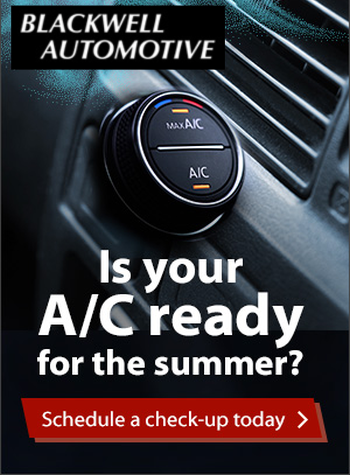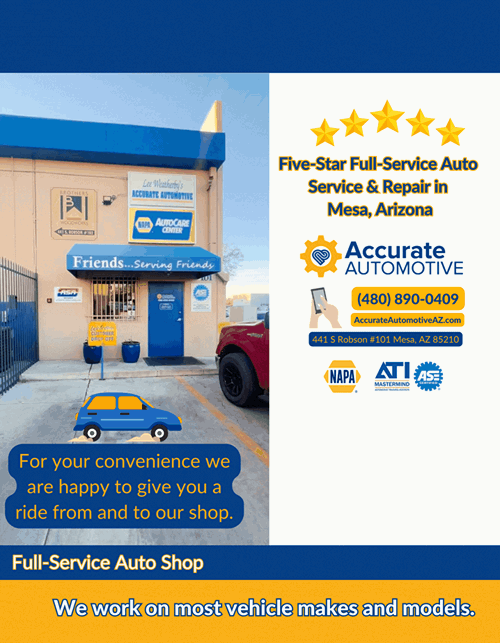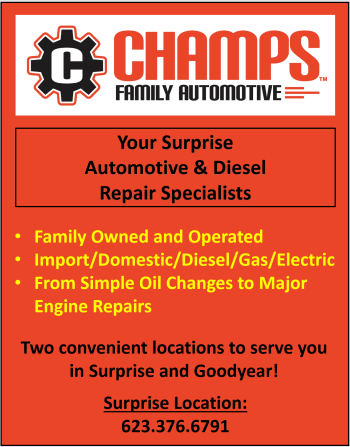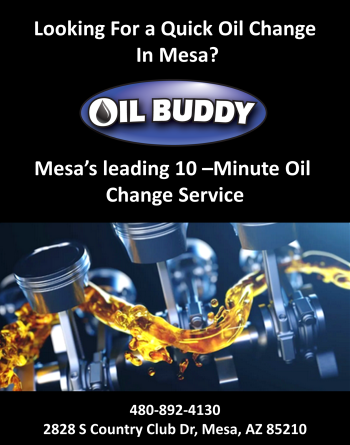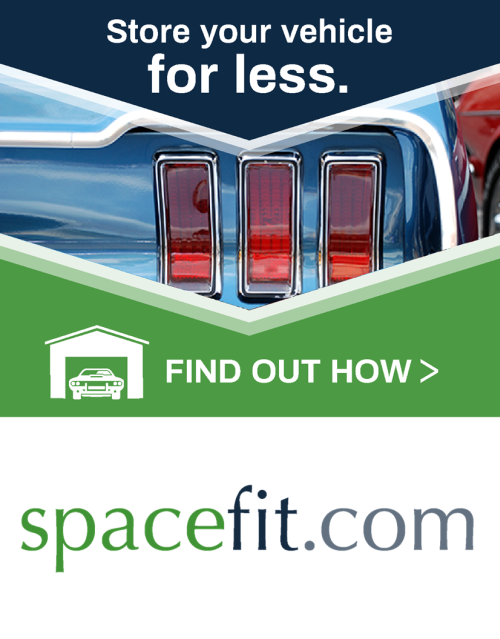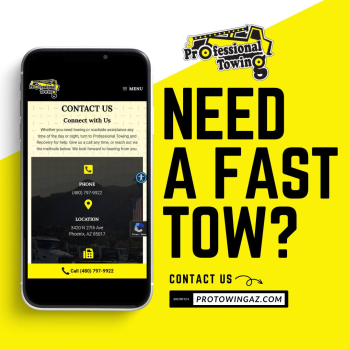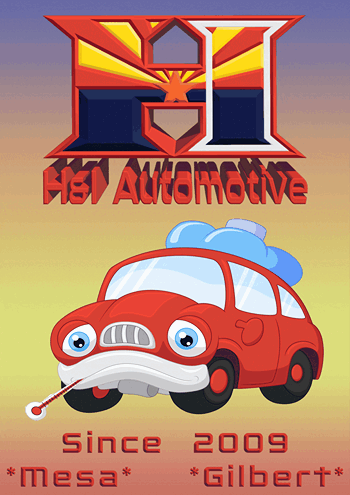

Welcome to Bumper to Bumper Radio!
Drive in anxious and cruise out confident with the best automotive information for your vehicle! Tune in to KTAR News 92.3 every Saturday from 11 a.m. to noon as Matt Allen helps listeners with their car problems. The show call in number is 602-277-5827.
Latest News From Bumper to Bumper Radio

“Peak refinery maintenance season has caused volatility across the country,” said Jeanette Casselano, AAA spokesperson. “Motorists can expect fluctuations at the pump likely through the end of the month due to ongoing maintenance and tighter gasoline supply.”
Today’s national average of $2.64 is one penny more than last week, two cents more than last month and 21-cents cheaper than last year.
Quick Stats
The nation’s top 10 most expensive markets are: California ($4.14), Hawaii ($3.64), Nevada ($3.44), Washington ($3.40), Oregon ($3.33), Alaska ($3.07), Arizona ($2.90), Idaho ($2.84), Pennsylvania ($2.75) and Utah ($2.74).
The nation’s top 10 largest weekly changes are: Kentucky (+10 cents), Oregon (+7 cents), Idaho (+6 cents), Delaware (+6 cents), Illinois (-6 cents), South Carolina (+6 cents), Michigan (+6 cents), Alaska (+5 cents), Washington (+5 cents) and Florida (+4 cents).
West Coast
Pump prices in the West Coast region are fluctuating after a number of refineries in the region underwent planned and unplanned maintenance. Adding to the challenge, operations at Marathon Petroleum’s San Francisco Bay Area 170,000 b/d refinery halted last week as a result of the earthquake that occurred last Monday. Production has resumed at the refinery, but continuing refinery challenges have put pressure on supply, which has contributed to the increases some motorists are seeing at the pump.
California ($4.14) and Hawaii ($3.64) are the most expensive markets in the country. Nevada ($3.44), Washington ($3.40), Oregon ($3.33), Alaska ($3.07) and Arizona ($2.90) follow. Oregon (+7 cents), Alaska (+6 cents) and Washington (+5 cents) saw the largest increases, while California (-3 cent) saw the largest decrease on the week.
The Energy Information Administration (EIA) report for the week ending Oct. 11, showed that total West Coast gasoline stocks took a slight draw from 26.25 million bbl to 26.23 million bbl. The current level is approximately 1.42 million bbl lower than this same time last year. Tighter supplies will continue to keep prices high this week, but as refineries resume normal gasoline production levels and imports enter the region, pump prices are expected to continue stabilizing.

LAS VEGAS, Oct. 16, 2019 -- Hyundai will unveil the Veloster "Grappler" concept at the 2019 SEMA show. The Grappler concept boasts increased ground clearance, combining superb approach and departure angles for confident off-roading capability, while custom front and rear brush guards were developed to ensure the Veloster Grappler is protected whenever the terrain turns unpredictable. Oversized all-terrain tires and rally-themed Method Racing® wheels yield a menacing demeanor and functional capability, while Borla® cat-back exhaust components add a visceral audible resonance.
For extra cargo capabilities, a roof-mounted Thule® utility basket includes a high-output lighting system from Baja Designs®. A full host of roof-mounted utility lights allow for versatility on the go.
From high-speed desert off-roading high beams to basecamp work lights, Veloster Grappler is ready for the unexpected from any adventure. The utility basket serves as a base mount for the removable solar panel from Goal Zero®, powering an all-electric portable power station mounted inside the cabin for remote journeys. A custom vinyl exterior body wrap features a ghosted Hyundai-themed livery. Finally, a Seibon® carbon-fiber hood effectively vents excess engine bay heat when things heat up out on the road.
Inside the cabin, the functional ruggedness theme continues. An integrated roll bar provides occupant protection and facilitates mounting for a full-size spare wheel and tire. Further outfitting the interior are traction mats, an oversized utility shovel, a Goal Zero® portable power station, roadside assistance kit, first aid kit, Napier® outdoor dome tent, Scosche® Mounts, Goal Zero® crush lights and premium Recaro® seats finished in a vintage hounds tooth check pattern. Exterior lighting is modulated through a custom-designed switch panel. Hyundai genuine accessories round out the functionality of the vehicle, adding sport pedals, a sport shifter, all-weather mats, ambient footwell lighting and cargo blocks.

LAS VEGAS, Oct. 16, 2019 -- Attendees at this year's AAPEX (Automotive Aftermarket Products Expo), taking place Nov. 5-7 in Las Vegas, will have the opportunity to see how the auto care industry is staying competitive in the age of advanced vehicle technologies. The aftermarket will soon be maintaining the cars of tomorrow and the Auto Care Association's Emerging Technologies Booth at AAPEX will present the latest solutions for standardization of the maintenance and repair of automated systems—ensuring safe and dependable vehicle operation long after the warranty expires.
The Emerging Technologies Booth will feature three informational kiosks highlighting vehicle technology progression, what the latest technological developments mean for the consumer and what the aftermarket industry is doing about it today. The Auto Care Association, in partnership with Q-Free, Concepts & Services Consulting (CSC), Southwest Research Institute (SwRI), OnBoard Security and Coolfire Solutions, will provide a wide range of information on the technologies, including: Advanced Driver Assistance Systems (ADAS); Connected and Automated Vehicles (CAVs); V2X; Automotive Embedded Systems and the Secure Vehicle Interface (SVI) through video demonstrations; live presentations; discussions; and more. Implementations of recently approved international standards that were sponsored by the association will be demonstrated, showing that direct, local access to vehicle data can be secure, safe and authorized by vehicle owners.
"In less than five years, 90% of new cars will be wirelessly transmitting real-time driver behavior and vehicle data," said Bill Hanvey, president and CEO, Auto Care Association. "These advanced vehicle technologies will have a lasting influence on our industry, which means securing the authentication and standardization of accessing vehicle telematics will be vital to the aftermarket's ability to maintain and repair these vehicles down the road."
"The importance of being able to control your own vehicle's data cannot be stressed enough," said Joe Register, vice president, emerging technologies, Auto Care Association. "The development of technical solutions based on SVI—standardizing the safe, secure and direct exchange of vehicle data—is ultimately what will give consumers lasting control over their data and their vehicles, allowing them to choose exactly which shop they want to have their vehicles serviced and repaired."

Despite an unseasonal spike in demand, according to the Energy Information Admiration’s (EIA) latest data sets, gas prices are decreasing for the majority of motorists across the country as crude oil prices (WTI) remain under $54/bbl. Today, the national average gas price is $2.63, which is two cents less than last week and 26 cents cheaper than last year, but six-cents more expensive than last month.
“The national gas price average has been gradually decreasing the past three weeks and we expect this trend to continue, barring any major industry or geopolitical events,” said Jeanette Casselano, AAA spokesperson. “But the real savings we’re seeing is when prices are compared to this same time last year. Drivers in some states are paying 40 cents less per gallon than they were last October.”
The largest weekly volatility with gas prices continues to happen in West Coast states, but that could be tapering off. EIA’s data shows that the region’s refinery utilization jumped up 10% and gasoline stocks were relatively stable for the week ending Oct. 4, meaning there could be some relief in sight.
Quick Stats
The nation’s top 10 largest weekly changes are: Michigan (-10 cents), Oregon (+10 cents), Kentucky (-7 cents), Washington (+7 cents), Florida (-6 cents), Alaska (+ 6 cents), Indiana (+5 cents), Georgia (-4 cents), Texas (-4 cents) and New Mexico (-3 cents).
The nation’s top 10 least expensive markets are: South Carolina ($2.25), Louisiana ($2.26), Mississippi ($2.26), Texas ($2.27), Alabama ($2.29), Missouri ($2.30), Virginia ($2.31), Arkansas ($2.31), Delaware ($2.31) and Oklahoma ($2.33).
West Coast
Most pump prices in the West Coast region have increased on the week. However, prices in the region appear to be stabilizing after a number of regional refineries experienced unplanned outages that reduced supply over the last few weeks.
California ($4.17) and Hawaii ($3.65) are the most expensive markets in the country. Nevada ($3.44), Washington ($3.35), Oregon ($3.26), Alaska ($3.01) and Arizona ($2.91) follow. Oregon (+10 cents) and Washington (+7 cents) saw the largest increases, while Hawaii (-2 cents) and California (-1 cent) saw the largest decreases.
The EIA report for the week ending October 4, showed that total West Coast gasoline stocks decreased from 27 million bbl to 26.25 million bbl. This level is approximately 2 million bbl lower than this same time last year. Tighter supplies will continue to keep prices high this week, but as refineries resume normal gasoline production levels, pump prices are expected to stabilize.

Automakers Provide Assistance to Owners of Hyundai and Kia Vehicles Equipped with Theta II GDI Engines
ORANGE COUNTY, Calif., Oct. 11, 2019 /PRNewswire/ -- Hyundai Motor America and Kia Motors America have entered into an agreement to resolve class action litigation with owners of certain vehicles equipped with Theta II gasoline direct injection (GDI) engines. This agreement will provide various cash compensation options, lifetime warranties, free inspection and repair of the covered engines, and installation of a software update Hyundai and Kia introduced after the case was filed to enhance safety and address this engine's performance. It also provides additional remedies to address engine concerns and assist customers with these vehicles.
Vehicles in the settlement include 2.3 million Hyundai (2011-2019 Sonata, 2013-2018 Santa Fe Sport, 2019 Santa Fe, and 2014, 2015, 2018, and 2019 Tucson) and 1.8 million Kia (2011-2019 model year Sportage, Sorento and Optima) vehicles with 2.0-liter and 2.4-liter GDI engines.
Terms of the settlement include:
- Cash reimbursement for certain past repairs and related expenses, such as towing and rental cars;
- Cash compensation for certain past trade-ins, sales, and in lieu of certain repairs;
- Free inspection and repair or replacement of damaged engines;
- Lifetime warranty coverage for short block assembly repairs for original and subsequent owners;
- Free installation of the knock sensor detection system software update;
- Various goodwill compensation for customers inconvenienced by previous lengthy engine repair times, denied warranty coverage, and vehicle loss of value, among other provisions





